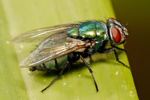Difference between revisions of "Insecta Flashcards"
Jump to navigation
Jump to search
| (4 intermediate revisions by one other user not shown) | |||
| Line 15: | Line 15: | ||
<FlashCard questions="8"> | <FlashCard questions="8"> | ||
| − | |q1=Fill in the missing words about the insect body | + | |q1=Fill in the missing words about the insect body: |
| − | |a1=< | + | <br /> |
| + | <small>The outer layer of the exoskeleton is called the _______ which is made of _______ and covered by a ____ ______. The inner layers of the exoskeleton are called the ______ and the _______ exocuticle which are made of protein and _______. | ||
| + | |a1=<small>The outer layer of the exoskeleton is called the epicuticle which is made of protein and covered by a waxy layer. The inner layers of the exoskeleton are called the endocuticle and the exocuticle which are made of protein and chitin. | ||
|l1=Insect_Structure_and_Function#Reproductive_System | |l1=Insect_Structure_and_Function#Reproductive_System | ||
|q2=What are halteres? | |q2=What are halteres? | ||
| Line 38: | Line 40: | ||
|q5=What are oviparous insects? | |q5=What are oviparous insects? | ||
|a5=Lay eggs outside of the body which hatch after deposition | |a5=Lay eggs outside of the body which hatch after deposition | ||
| − | |l5= | + | |l5=Insect_Life_Cycles |
|q6=What are viviparous insects? | |q6=What are viviparous insects? | ||
|a6= | |a6= | ||
*Lay larvae or nymphs | *Lay larvae or nymphs | ||
*Eggs rupture in female reproductive system | *Eggs rupture in female reproductive system | ||
| − | |l6= | + | |l6=Insect_Life_Cycles |
|q7=Summarise simple metamorphosis and give an example of a species of insect which uses it | |q7=Summarise simple metamorphosis and give an example of a species of insect which uses it | ||
|a7= | |a7= | ||
| Line 50: | Line 52: | ||
*Nymph becomes an adult | *Nymph becomes an adult | ||
*Lice | *Lice | ||
| − | |l7= | + | |l7=Insect_Life_Cycles |
|q8=Summarise complex metamorphosis and give an example of a species of insect which uses it | |q8=Summarise complex metamorphosis and give an example of a species of insect which uses it | ||
|a8= | |a8= | ||
| Line 58: | Line 60: | ||
*Adult emerges from pupa | *Adult emerges from pupa | ||
*Flies | *Flies | ||
| − | |l8= | + | |l8=Insect_Life_Cycles |
</FlashCard> | </FlashCard> | ||
| − | [[Category:Flashcards]] | + | [[Category:Parasite Flashcards]] |
[[Category:Insecta]] | [[Category:Insecta]] | ||
Latest revision as of 13:46, 7 February 2011
Insecta
Myiasis Producing Flies Flashcards
| Question | Answer | Article | |
| Fill in the missing words about the insect body:
|
The outer layer of the exoskeleton is called the epicuticle which is made of protein and covered by a waxy layer. The inner layers of the exoskeleton are called the endocuticle and the exocuticle which are made of protein and chitin.
|
Link to Article | |
| What are halteres? |
|
Link to Article | |
| What are spiracles? |
|
Link to Article | |
| What is the name of the general insect body system? | Haemocoele
|
Link to Article | |
| What are oviparous insects? | Lay eggs outside of the body which hatch after deposition
|
Link to Article | |
| What are viviparous insects? |
|
Link to Article | |
| Summarise simple metamorphosis and give an example of a species of insect which uses it |
|
Link to Article | |
| Summarise complex metamorphosis and give an example of a species of insect which uses it |
|
Link to Article | |
